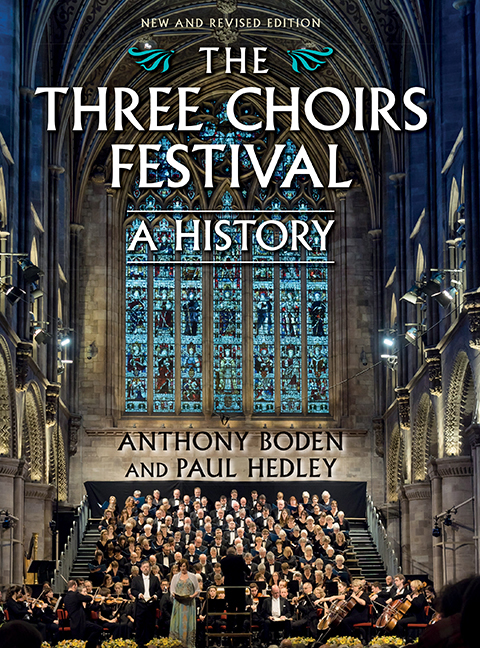Book contents
- Frontmatter
- Contents
- List of Illustrations
- Preface
- Acknowledgements
- List of Abbreviations
- List of Cathedral Organists
- 1 Origins
- 2 A Fortuitous and Friendly Proposal
- 3 A Numerous Appearance of Gentry
- 4 ‘The Musick of my Admiration Handel’
- 5 The Gentlemen and the Players
- 6 Avoiding Shipwreck
- 7 Prima voce
- 8 Favourites and Flops
- 9 Sacred and Profane
- 10 Froissart
- 11 The Unreasonable Man
- 12 The Dream
- 13 Beyond these Voices
- 14 An Essentially English Institution
- 15 The Elgar Festivals
- 16 Dona nobis pacem
- 17 Recovery
- 18 Association
- 19 A New Epoch
- 20 Jubilee
- 21 Theme with Variations
- 22 Houses of the Mind
- 23 ‘A Gold-Plated Orchestra’
- 24 A New Millennium
- 25 Reorganisation
- 26 An Invitation to the Palace
- Appendix Three Choirs Festival Timeline
- Select Bibliography
- Index
- Plate section
23 - ‘A Gold-Plated Orchestra’
Published online by Cambridge University Press: 11 August 2017
- Frontmatter
- Contents
- List of Illustrations
- Preface
- Acknowledgements
- List of Abbreviations
- List of Cathedral Organists
- 1 Origins
- 2 A Fortuitous and Friendly Proposal
- 3 A Numerous Appearance of Gentry
- 4 ‘The Musick of my Admiration Handel’
- 5 The Gentlemen and the Players
- 6 Avoiding Shipwreck
- 7 Prima voce
- 8 Favourites and Flops
- 9 Sacred and Profane
- 10 Froissart
- 11 The Unreasonable Man
- 12 The Dream
- 13 Beyond these Voices
- 14 An Essentially English Institution
- 15 The Elgar Festivals
- 16 Dona nobis pacem
- 17 Recovery
- 18 Association
- 19 A New Epoch
- 20 Jubilee
- 21 Theme with Variations
- 22 Houses of the Mind
- 23 ‘A Gold-Plated Orchestra’
- 24 A New Millennium
- 25 Reorganisation
- 26 An Invitation to the Palace
- Appendix Three Choirs Festival Timeline
- Select Bibliography
- Index
- Plate section
Summary
MICHAEL Kennedy's essay ‘Musings on the Three Choirs’ has already been mentioned. Published in the programme book of the 1997 Festival at Hereford, it embraced Kennedy's reflections on Three Choirs past and present and, as the twentieth century drew ever closer towards the twenty-first, posed a few timely and pertinent questions about repertoire. Kennedy also looked back to Elgar's involvement with the Festival, considered the steady decline in the great man's reputation in London during the composer's lifetime, but pointed out that, in spite of this, ‘in his own West Country [Elgar] was sovereign in his kingdom’. Kennedy then moved on to write of that other undisputed ‘giant personality’, Ralph Vaughan Williams, whose Three Choirs association lasted unbroken (except for two world wars) from 1911 to 1957: ‘Where Elgar was autocratic’, wrote Kennedy, ‘Vaughan Williams was democratic.’ Kennedy himself had been in Worcester in 1954:
when, at the age of 82 and now a stooping oak-like figure, [RVW] conducted the first performance of his Christmas cantata Hodie. ‘Far too difficult’, he told me afterwards, but no-one else has quite captured its essence as he did. Gerald Finzi was there that day, another much-missed figure, whose Dies natalis belongs to the walls of the three cathedrals as potently as any of Elgar's works, and ‘John’ (Herbert) Sumsion, whose recent death [in 1995] severed the last significant musical link with Elgar. At that period Sumsion, David Willcocks and Melville Cook were a triumvirate easily the equal of their predecessors and successors. They laid the foundations of the modern festivals while preserving the hallowed traditions.
William Walton was never a Three Choirs composer, although his Viola Concerto, first performed in 1929, was included in the Worcester programme in 1932 and was hated by Elgar. For some extraordinary reason, Belshazzar's Feast was not admitted into the cathedrals until 1957, 26 years after its sensational Leeds premiere.
- Type
- Chapter
- Information
- The Three Choirs Festival: A HistoryNew and Revised Edition, pp. 336 - 356Publisher: Boydell & BrewerPrint publication year: 2017

